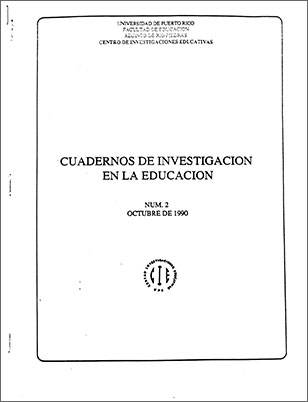Abstract
How to cite:
Caraballo, J. N. (1990). La síntesis de investigaciones a través del meta-análisis. Cuaderno de Investigación en la Educación, 2, 3- 11. Retrieved from https://revistas.upr.edu/index.php/educacion/article/view/16353
References
Campbell, D.T. y J.S. Stanley (1963). Experimental and Quasi-experimental Designs in Education. Chicago: Rand McNally.
Carlberg, C.G., D.W. Johnson, R. Johnson, G. Maruyama, K. Kavale, C.C. Kulik, R.S. Lysakowsi, S.W. Pflaum y H.J. Walberg (1984). Meta-analysis in education: How it has been used? Educational Researcher, 13(8), 6-15.
Cochran, W.G. (1937). Problems arising in the analysis of a series of similar experiments. Journal of the Roval Statistical Society (suplemento), 4, 102- 118.
Cooper, H.M. y R. Rosenthal (1980). Statistical vs. traditional procedures for summarizing research findings. Psycholoical Bulletin, 87, 442-449.
Fisher, R.A. (1932). Statistical methods for researh workers (4ta. ed.). London: Oliver and Boyd.
Gianconia, R.M. y L.V. Hedges (1982). Identifying features of effective open education. Review of Educational Research, 52(4), 579-602.
Glass, G.V. (1976). Primary, secondary, and meta-analysis of research. Educational Researcher, 5, 3-8.
Glass, G.V., B. McGaw y M.L. Smith (1981). Meta-analysis in social research. Beverly Hills, CA: Sage.
Guskey, T.R. y S.L. Gates (1986). Synthesis of research on the effects of mastery learning in elementary and secondary classrooms. Educational Leadership, 43(8), 73-80.
Hedges, L.V. (1984). Estimation of effect size under nonrandom sampling: The effects of censoring studies yielding statistically insignificant mean differences. Journal of Educational Statistics. 9(1), 61-85.
Hedges, L.V. (1985). Issues in meta-analysis. Review of Research in Education, 13, 353- 396.
Hedges, L.V., J.A. Shymansky y G. Woodworth (1989). Modern methods of meta- analysis. Washington, DC: National Science Teachers Association.
Hedges, L.V. e I. Olkin (1985). Statistical methods for meta-analysis. Orlando, Fla.: Academic Press.
Kulik, J.A., C.C. Kulik y P.A. Cohen (1980). Effectiveness of computer-based college teaching: A meta-analysis of findings. Review of Educational Research, 50, 525-544.
Pearson, K. (1933). On a method for determining wether a sample of given size n supposed to be drawn from a parent population having known probability integral has probability drawn at random. Biometrika, 25, 379-410.
Slavin, R.E. (1984). Meta-analysis in education: How it has been used? Educational Researcher, 13, 6-15.
Slavin, R.E. (1984). A rejoinder to Carlberg et. al. Educational Researcher, 13(8), 24-27.
Slavin, R.E. (1986). Best-evidence synthesis: An alternative to meta-analytical and traditional research. Educational Researcher, 15(9), 5-11.
Slavin, R.E. (1987). Best-evidence synthesis: Why less is more. Educational Researcher, 16(4), 15-16.
Tippet, L.C.H. (1931). The method of statistics. London: Williams and Norgate.
Walberg, H.J. (1984). Meta-analysis in education: A reply to Slavin. Educational Researcher, 13(8), 16-23.
Wolf, F.M. (1986). Meta-analisis: Quantitative methods for research synthesis. Beverly Hills, CA: Sage.
Yates, F. y W.G. Cochran (1938). The analysis of groups of experiments. Journal o f Agricultural Science, 28, 556-580.
The contents published in the Puerto Rico Journal of Education is freely distributed under open access practices, in accordance with the Creative Commons license, Attribution-NonCommercial 4.0 International (CC BY-NC 4.0). Through these principles, the journal and its authors allow readers to access, reproduce and share articles in full text. Users should give credit to authors in a reasonable way without suggesting they have their support. Under no circumstances, readers may make use of the contents for commercial purposes. The authors retain copyright on their works.

